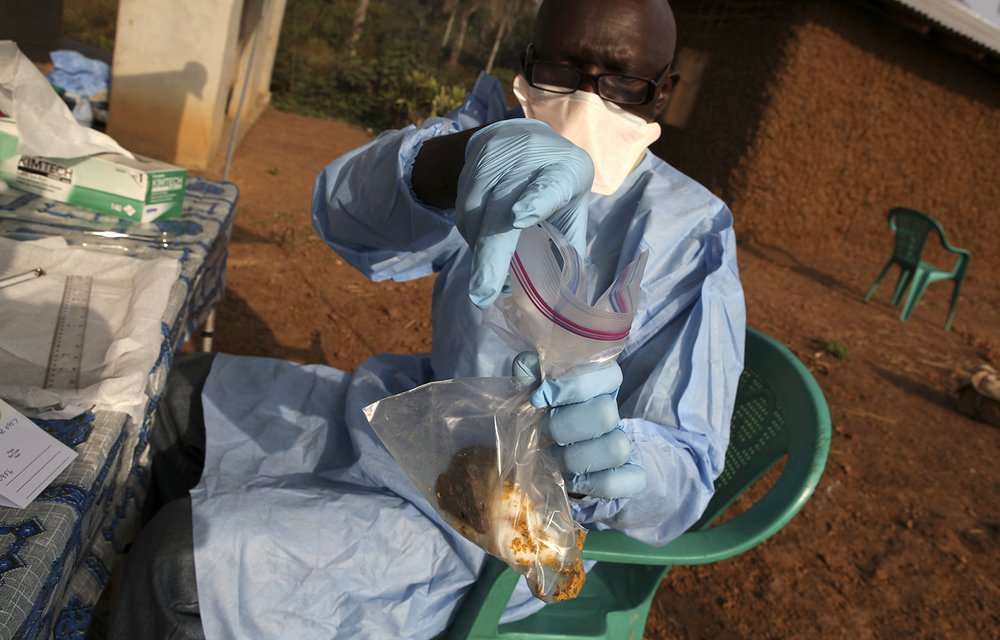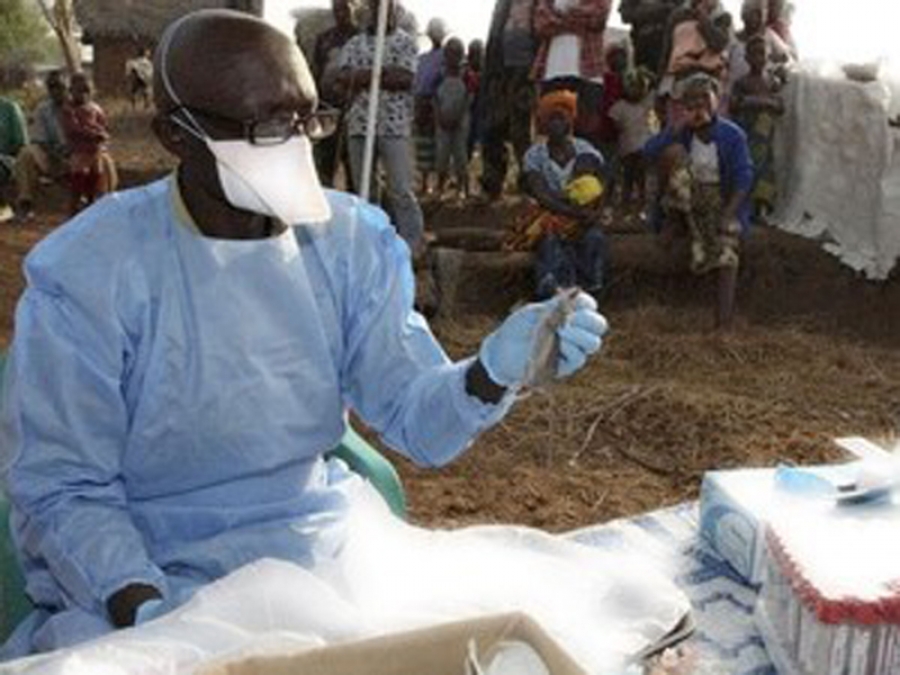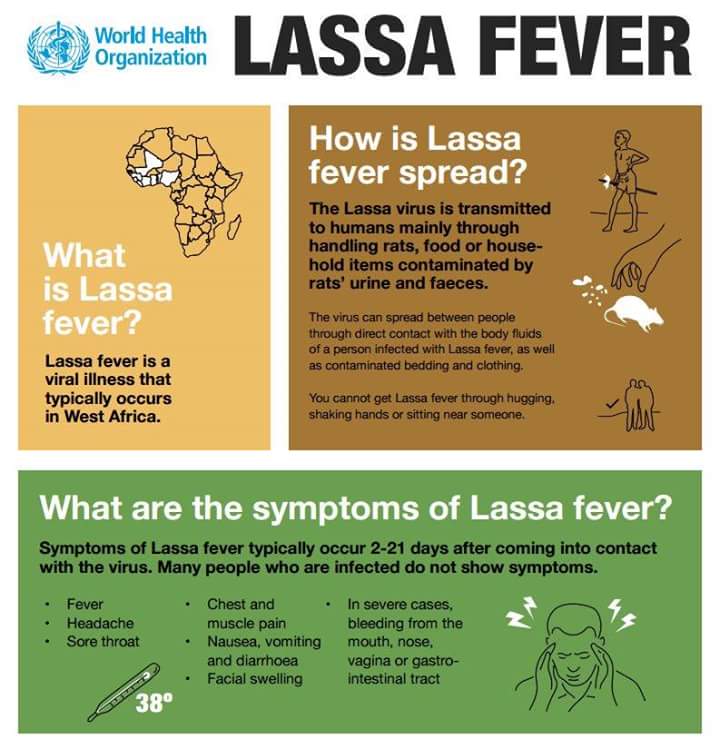Health
FG Strengthens Efforts to Combat Lassa Fever Outbreak

By Adedapo Adesanya
The federal government through the Ministry of Environment has strengthened responses to the current Lassa fever outbreak in the country as cases continue to rise.
In a statement signed by the Director of Press in the Ministry of Environment, Saghir el Mohammed, it was stated that the most recent situation report from the Nigeria Centre for Disease Control (NCDC) on January 16, 2022, indicated that the country recorded 96 confirmed cases and 11 deaths from January 3 to January 16, 2022, in 27 local government areas across 11 states.
These states are Bauchi, Edo, Ondo, Benue, Taraba, Kaduna, Plateau, Kogi, Cross River, Ebonyi and Oyo.
The NCDC added that 510 confirmed cases and 102 deaths occurred from January 2021 to January 2, 2022.
The statement revealed that activities on environmental health and sanitation response to the Lassa fever outbreak in the country have been put in place.
Mr Mohammed noted that the Minister of State for the Environment, Ms Sharon Ikeazor, has already embarked on environmental health and sanitation response campaign in 11 states of the federation to ensure improvement in environmental sanitation of premises, abatement of the nuisance, rodent control, food hygiene and safety.
Ms Ikeazor, while noting that Nigeria was currently experiencing an increasing number of reported Lassa fever cases across the country, revealed that before the recent outbreak, the ministry had taken proactive measures to improve the overall sanitation and hygiene situation in the country by establishing sanitation desks in all the 36 states of the federation and the FCT to ensure proper monitoring and proactive measures on environmental health issues and concerns.
She said: “This is in addition to the setting up of Environmental Health Surveillance Systems (EHSS) designed to strengthen cooperation between the states and federal government on environmental health and sanitation issues, which would aid information/data gathering and sharing between the federal, state and local governments.
“They are also involved in prevention and containment activities including surveillance/monitoring and reporting of Lassa fever cases and other environmental determinant diseases to the Federal Ministry of Environment. The Sanitation Desks are being replicated in all the 774 LGAs in the country.”
The Minister added that the ministry, over the years, had collaborated with the NCDC, World Health Organisation (WHO) and other stakeholders to carry out activities to prevent and contain the perennial Lassa fever outbreaks in Nigeria.
She stated that the ministry’s environmental health officers, in collaboration with sanitation desks in the states and local government environmental health officers, are currently in the field implementing environmental sanitation response activities in Lassa fever affected states.
“As a ministry, we remain committed to our mandate of pest and vector control in Nigeria. To this end, we are entrenching sustainable programmes focusing on eliminating and reducing breeding avenues for disease vectors which involve fostering collaboration with relevant stakeholders.
“Furthermore, we shall continue to develop the capacity of Environmental Health Practitioners in the federal, state and local government jurisdictions. State Ministries of Environment are hereby enjoined to develop a comprehensive Lassa fever prevention programme that will include rodent infestation survey and deratisation,” Ms Ikeazor stated.
She, however, assured the general public that the ministry remained committed to ensuring that the environment would remain clean, healthy and safe for all.
Lassa fever virus is transmitted by rodents (rats), which could be found in our environment including homes, motor parks, offices and even places of worship. This contributes largely to the risk of spread that occurs in Nigeria and other countries with similar ecological factors.
The Minister, therefore, called on members of the public to keep their surroundings clean, keep food away from rodents, store grains and other foodstuffs in rodent-proof containers and cook all foods thoroughly before consumption.
She also advised residents to block rat hideouts, carry out deracization, put an end to the practice of eating rats, dry farm produce in hygienic manners by refraining from drying crops on the ground where rodents could freely run through; as Lassa fever is often associated with poor sanitary and hygiene practices with cases being recorded all year round.
Health
Lagos Steps up Mandatory Health Insurance Drive

By Modupe Gbadeyanka
Efforts to entrench mandatory health insurance through the Ilera Eko Social Health Insurance Scheme in Lagos State have been stepped by the state government.
This was done with the formal investiture of the Commissioner for Health, Professor Akin Abayomi, and the Special Adviser to the Governor on Health, Mrs Kemi Ogunyemi, as Enforcement Leads of the Lagos State Health Scheme Executive Order and ILERA EKO Champions.
The Commissioner described the recognition as both symbolic and strategic, noting that Lagos is deliberately shifting residents away from out-of-pocket healthcare spending to insurance-based financing.
“We have been battling with how to increase enrolment in ILERA EKO and change the culture of cash payment for healthcare. Insurance is a social safety net, and this mindset shift is non-negotiable,” he said.
He recalled that Lagos became the first state to domesticate the 2022 National Health Insurance Authority (NHIA) Act through an Executive Order issued in July 2024, making health insurance mandatory. He stressed that the decision reflected the Governor’s strong commitment to healthcare financing reform, adding, “When Mr. Governor personally edits and re-edits a document, it shows how critical that issue is to the future of Lagosians.”
Mr Abayomi also warned against stigmatisation of insured patients, describing negative attitudes towards Ilera Eko enrolees as a major barrier to uptake. “If someone presents an Ilera Eko card and is treated as inferior, uptake will suffer. That must stop,” he said, pledging to prioritise insurance compliance during facility inspections. “The key question I will keep asking is: ‘Where is the Ilera Eko?’”
In her remarks, Mrs Ogunyemi, said the enforcement role goes beyond a title, stressing that the health insurance scheme is now law.
“This is about Universal Health Coverage and equitable access to quality healthcare for everyone in Lagos State,” she said, noting that ILERA EKO aligns with the state’s THEMES Plus Agenda.
She commended the Lagos State Health Management Agency (LASHMA) for aggressive sensitisation efforts across the state, saying constant visibility was necessary to address persistent gaps in public knowledge. “People are still asking, ‘What is Ilera Eko?’ ‘Where do I enrol?’ Those questions tell us the work must continue,” she said.
She urged all directors and health officials to mainstream Ilera Eko promotion in every programme and engagement, emphasising that responsibility for health insurance advocacy does not rest with LASHMA alone. “When people come with medical bills, the first question should be: are you insured?” she said, adding that early enrolment remains critical as premiums rise over time.
Earlier, the Permanent Secretary of LASHMA, Ms Emmanuella Zamba, said the investiture marked a critical step in positioning leadership to drive enforcement of the Executive Order across the public service.
“What we are undertaking is pioneering in Nigeria. All eyes are on Lagos as we demonstrate how mandatory health insurance can work,” she said.
Ms Zamba disclosed that enforcement nominees across Ministries, Departments and Agencies have been trained, with a structure in place to ensure compliance beyond the health sector.
According to her, “This initiative cuts across the entire public service, particularly public-facing MDAs, in line with the provisions of the Executive Order.”
She explained that the formal designation of the Commissioner and the Special Adviser as Enforcement Leaders was meant to strengthen compliance, alongside the Head of Service, while also recognising their consistent advocacy for universal health coverage. “This decoration is to amplify their roles and appreciate the leadership they have shown,” she said.
Health
Tinubu Transmits 24 Bills to Reduce Bloated Health Sector Boards to Senate

By Adedapo Adesanya
President Bola Tinubu has transmitted 24 bills for consideration of the Senate which seeks to reduce the country’s over-bloated board memberships in the health sector.
The bills were conveyed alongside a letter addressed to President of Senate, Godswill Akpabio, and read at plenary on Tuesday, in line with Section 58(2) of the 1999 Constitution of Federal Republic of Nigeria.
President Tinubu said the proposed legislations followed a comprehensive review of existing health sector laws by the Attorney-General of the Federation and Minister of Justice.
He said the review, approved by the Federal Executive Council (FEC), was in collaboration with the Minister of Health and Social Welfare, Professor Muhammad Ali Pate.
According to the President, the bills aims at streamlining governance structures across health institutions by reducing over-bloated board memberships.
This, he said, would improve efficiency, effectiveness, and service delivery within the sector.
According to him, the proposed legislations cover a wide range of health institutions and regulatory bodies, including tertiary and teaching hospitals, specialty hospitals, professional councils, and regulatory agencies.
He said the bills transmitted to the Senate includes the National Hospital for Women and Children, Abuja, Federal Medical Centres, National Specialty Hospitals Management Board; Orthopaedic Hospitals Management Board
Others are the National Eye Centre, National Ear Care Centre, Nursing and Midwifery Council of Nigeria; Medical Laboratory Science Council of Nigeria, the National Agency for Food and Drug Administration and Control (NAFDAC) and the National Blood Service Agency, among others.
The President also listed additional legislative proposals such as the Records Officers Registration and Digital Health Bill 2025 and the Federal College of Complementary and Alternative Medicine Bill 2025.
President Tinubu expressed confidence that the Senate would give the bills careful and judicious consideration in the interest of strengthening Nigeria’s health sector.
After the letter accompanying the bills was read, Senate President referred all the 24 bills to the Senate Committee on Rules and Business for further legislative action.
Health
Africa Wellness Voices Initiative Promotes Mental Wellbeing

By Adedapo Adesanya
A new pan-African mental wellness campaign, the Africa Wellness Voices Initiative (AWVI), is set to launch this February, bringing together voices from across Africa to promote mental wellbeing, reduce stigma, and encourage supportive conversations around mental health.
Led by SereniMind, a mental health and wellness organization, AWVI will spotlight different African countries daily throughout February by sharing short wellness statements from individuals, organizations, youth leaders, and institutions.
Each daily feature will highlight local perspectives on mental wellbeing while reinforcing a shared continental message: mental health matters, it said in a statement shared with Business Post.
Mental health remains a critical but under-addressed issue across Africa. According to the World Health Organisation (WHO), depression affects more than 66 million people in the African Region, while mental health services remain limited in many countries. Young people are particularly affected, facing stigma, lack of awareness, and barriers to accessing support.
AWVI said it aims to address these gaps through a unified, prevention-focused awareness campaign that leverages digital platforms to reach communities across borders. In addition to featured voices, members of the public are encouraged to participate by sharing short wellness videos on social media, fostering grassroots engagement and peer-to-peer support.
Speaking on the initiative, Mr Oyenuga Ridwan, Founder of SereniMind, said: “Across Africa, too many people suffer in silence when it comes to mental health. Africa Wellness Voices Initiative is about unity, bringing together Africans from different countries, ages, and backgrounds to normalize conversations around wellbeing and remind people that seeking support is a strength, not a weakness.”
The February campaign is expected to reach 15–25 African countries, feature 60–120 individuals and organizations, and generate over 500,000 digital impressions across platforms including Instagram, LinkedIn, X (formerly Twitter), and TikTok. The organizers hope to scale the initiative in future editions to include all 54 African countries.
AWVI says it aligns with broader continental and global priorities on health, youth empowerment, and wellbeing, contributing to conversations around preventive mental health, community resilience, and inclusive development.
Through technology, partnerships, and community engagement, SereniMind works to promote wellbeing and reduce stigma around mental health.
-

 Feature/OPED6 years ago
Feature/OPED6 years agoDavos was Different this year
-
Travel/Tourism9 years ago
Lagos Seals Western Lodge Hotel In Ikorodu
-

 Showbiz3 years ago
Showbiz3 years agoEstranged Lover Releases Videos of Empress Njamah Bathing
-

 Banking8 years ago
Banking8 years agoSort Codes of GTBank Branches in Nigeria
-

 Economy3 years ago
Economy3 years agoSubsidy Removal: CNG at N130 Per Litre Cheaper Than Petrol—IPMAN
-

 Banking3 years ago
Banking3 years agoSort Codes of UBA Branches in Nigeria
-

 Banking3 years ago
Banking3 years agoFirst Bank Announces Planned Downtime
-

 Sports3 years ago
Sports3 years agoHighest Paid Nigerian Footballer – How Much Do Nigerian Footballers Earn














